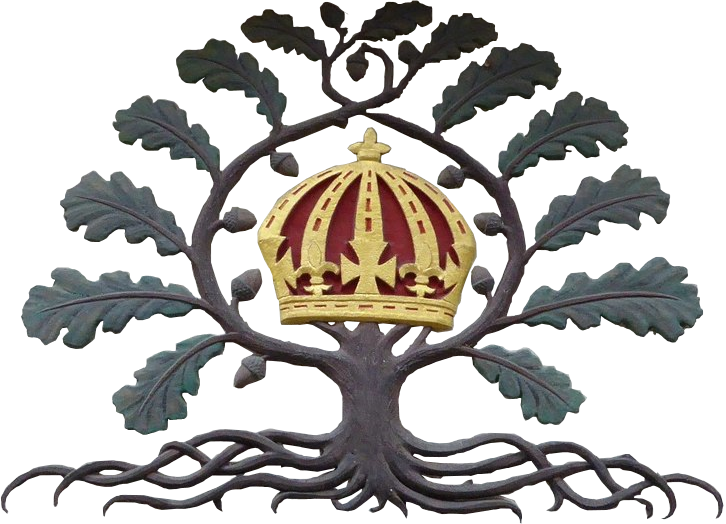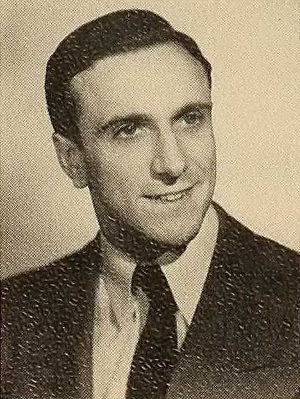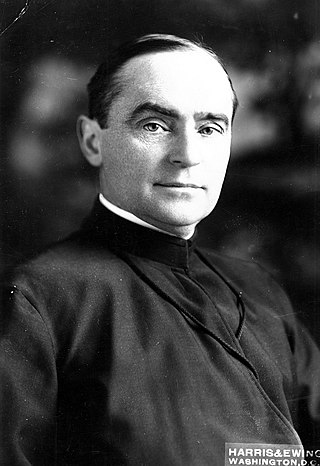Ross John Swartz Hoffman (February 2, 1902 - December 16, 1979) was an American historian, writer, educator, and conservative intellectual who specialized in Modern European History and International Affairs.
Ross John Swartz Hoffman (February 2, 1902 - December 16, 1979) was an American historian, writer, educator, and conservative intellectual who specialized in Modern European History and International Affairs.
Born on February 2, 1902, in Harrisburg, Pennsylvania, Hoffman attended Lafayette College (A.B., 1923) and the University of Pennsylvania (M.A., 1926; Ph.D., 1932). His doctoral dissertation ("Great Britain and the German Trade Rivalry, 1875-1914"), prepared under the supervision of William Ezra Lingelbach, was published by the University of Pennsylvania Press in 1933 and received the George Louis Beer Prize from the American Historical Association in 1934.
Hoffman began his teaching career at New York University, where he was an Instructor (1926-1933) and then Assistant Professor of History (1933-1938). Hoffman had initially rejected the Protestant Christianity that he was raised in by his parents, who were of German descent, and was instead attracted to Socialism. [1] However, the study of history, as well as traveling throughout Europe, observing world events in the 1920s, and a thorough reading of scripture led him he to convert to Roman Catholicism in 1931. [1] [2] He described his conversion in his book, Restoration (Sheed, 1934). In the introduction that he contributed to Peter Guilday (ed.), The Catholic Philosophy of History (P. J. Kenedy, 1936), Hoffman noted (page ix) that, "Strictly speaking, the Catholic faith is not the philosophy of history, but it gives light to see the meaning of history; it does not reveal or explain the whole structure of the process, but it does point the direction and the end. Without this light man is blind and the historical process, in the last analysis, is an impenetrable mystery; with it, man may see a little way at least into the reason that lies hidden."
When the Rev. Robert I. Gannon, President of Fordham University, a Jesuit institution, approached Hoffman about joining the History faculty at Fordham, he agreed. At Fordham, he began as an Associate Professor (1938-1944) and then Professor of History (1944-1967). He was made Professor Emeritus in 1967. [3]
Hoffman was married to Hannah Elizabeth McCruden (1926), and they had one child. [3]
Hoffman published articles and books on both current and historical events, and contributed to a short-lived conservative journal, The American Review. He condemned Fascism in the 1920s and 30s, and then Communism in the 1950s and 60s. Unlike his Fordham colleague Charles C. Tansill, who was an isolationist and who argued against American involvement in the Second World War, Hoffman argued for American intervention on conservative and Christian grounds. [2]
Several of Hoffman's books dealt with world events: The Will to Freedom (Sheed, 1935); Tradition and Progress, and Other Historical Essays in Culture, Religion, and Politics (Bruce Books, 1938); The Organic State: An Historical View of Contemporary Politics (Sheed, 1939); The Great Republic: A Historical View of the International Community and the Organization of Peace (Sheed, 1942); (with C. G. Haines) Origins and Background of the Second World War (Oxford University Press, 1943; 2nd edition, 1947); Durable Peace: A Study in American National Policy (Oxford University Press, 1944); and The Spirit of Politics and the Future of Freedom (Bruce Books, 1951). He also co-authored (with Gaetano L. Vincitorio and Morrison V. Swift) a textbook, Man and His History: World History and Western Civilization (Doubleday, 1958; revised ed., 1963). [3]
Hoffman is often cited as helping to revive American academic interest in Edmund Burke, and published two books on the British statesman: (with A. Paul Levack) Burke's Politics: Selected Writings and Speeches on Reform, Revolution, and War (Knopf, 1949); and Edmund Burke, New York Agent, with His Letters to the New York Assembly and Intimate Correspondence with Charles O'Hara, 1761-1776 (American Philosophical Society, 1956). He also contributed to Peter J. Stanlis (ed.) The Relevance of Edmund Burke (P. J. Kenedy, 1964).
Hoffman's final book was The Marquis: A Study of Lord Rockingham, 1730-1782 (Fordham University Press, 1973). He was the recipient of a Festschrift from former students and other admirers, Crisis in the "Great Republic": Essays Presented to Ross J. S. Hoffman, edited by Gaetano L. Vincitorio and James E. Bunce et al. (Fordham University Press, 1969).
Historian John P. McCarthy credits Hoffman with two significant contributions to the American conservative movement, writing that "he worked to broaden it from an essentially non-conservative emphasis on American uniqueness ... [and] helped conservatives identify the American constitutional heritage with an older tradition of limitations on government dating back through medieval times," as well as leaving "a deep impression on many first generation American graduate students about the depth of their Catholic and European heritage." [2]
Hoffman was the recipient of honorary degrees from Villanova College (D.Litt., 1936); Marquette University (LL.D., 1937); Fordham University (LL.D., 1947); St. John's University (LL.D., 1970); University of Detroit (L.H.D., 1950); and the National University of Ireland (Litt.D., 1957). He was President of the American Catholic Historical Association during 1938-1939, and received the King Award from U.S. Catholic Historical Society in 1975. [3]
Conservatism is a cultural, social, and political philosophy that seeks to promote and to preserve traditional institutions, practices, and values. The central tenets of conservatism may vary in relation to the culture and civilization in which it appears. In Western culture, depending on the particular nation, conservatives seek to promote a range of social institutions such as the nuclear family, organized religion, the military, property rights, and monarchy. Conservatives tend to favor institutions and practices that guarantee stability and evolved gradually. Adherents of conservatism often oppose certain aspects of modernity and seek a return to traditional values, though different groups of conservatives may choose different traditional values to preserve.

Edmund Burke was an Anglo-Irish statesman, economist, and philosopher. Born in Dublin, Burke served as a member of Parliament (MP) between 1766 and 1794 in the House of Commons of Great Britain with the Whig Party.

Francis Joseph Spellman was an American prelate of the Catholic Church. From 1939 until his death in 1967, he served as the sixth Archbishop of New York; he had previously served as an auxiliary bishop of the Archdiocese of Boston from 1932 through 1939. He was created a cardinal in 1946.

Fr. Edmund Aloysius Walsh, S.J. was an American Jesuit Catholic priest, author, professor of geopolitics and founder of the Georgetown University School of Foreign Service, the first school for international affairs in the United States. He founded the school in 1919–six years before the U.S. Foreign Service itself existed–and served as its first regent.

Louis Francis Budenz was an American activist and writer, as well as a Soviet espionage agent and head of the Buben group of spies. He began as a labor activist and became a member of the Communist Party USA. In 1945, Budenz renounced Communism and became a vocal anti-Communist, appearing as an expert witness at governmental hearings and writing about his experiences.
Bruce P. Frohnen is a Professor of Law at Ohio Northern University College of Law, where he teaches courses in Public and Constitutional Law, Jurisprudence, and Legal Profession.

Lawrence Henry Gipson was an American historian, who won the 1950 Bancroft Prize and the 1962 Pulitzer Prize for History for volumes of his magnum opus, the fifteen-volume history of "The British Empire Before the American Revolution", published 1936–70. He was a leader of the "Imperial school" of historians who studied the British Empire from the perspective of London, and generally praised the administrative efficiency and political fairness of the Empire.
Robert Alexander Nisbet was an American sociologist, a professor at the University of California, Berkeley, Vice-Chancellor at the University of California, Riverside, and an Albert Schweitzer Professor at Columbia University.
Events from the year 1747 in Ireland.
Denis Rolleston Gwynn (1893–1973) was an Irish journalist, writer and professor of modern Irish history. He served in the British Army in World War I.

Traditionalist conservatism, often known as classical conservatism, is a political and social philosophy that emphasizes the importance of transcendent moral principles, manifested through certain natural laws to which society should adhere prudently. Traditionalist conservatism is based on Edmund Burke's political views. Traditionalists value social ties and the preservation of ancestral institutions above excessive individualism.

Justin McCarthy, 1st Viscount Mountcashel, PC (Ire), was a Jacobite general in the Williamite War in Ireland and a personal friend of James II. He commanded Irish Army troops during the conflict, enjoying initial success when he seized Bandon in County Cork in 1689. However, he was defeated and captured at the Battle of Newtownbutler later in the same year. He escaped and was accused of having broken parole. After the end of the war, he led an Irish Brigade overseas for service in the French Army. He died in French exile.
William Denis Griffin was an American historian, author, and educator who specialized in Modern European History, particularly Anglo-Irish political and social history in the eighteenth and nineteenth centuries, Irish history, and the revolutionary era.

James Edward Bunce was an American historian, author, and educator who specialized in British and American colonial history.

Gaetano Leonard "Tom" Vincitorio was an American historian, author, and educator who specialized in Modern European History, particularly the British politician Edmund Burke.

Charles Callan Tansill was an American historian and the author of fourteen history books. He was a professor of history at American University, Fordham University, and Georgetown University. An isolationist before World War II, he was accused of revisionism after the war.
Traditionalist conservatism in the United States is a political, social philosophy and variant of conservatism based on the philosophy and writings of Aristotle and Edmund Burke.

Alphonsus J. Donlon was an American Catholic priest and Jesuit who spent his career in priestly ministry and academia, including as president of Georgetown University from 1912 to 1918. Born in Albany, New York, he garnered a reputation as a good student and an exceptional collegiate athlete. As a professor, he went on to lead Georgetown University's sports program, which enjoyed great success. As a result, he became known as the "father of Georgetown athletics." He served as a professor of various sciences at Georgetown University and at Woodstock College, and as president of the former, he oversaw the removal of Georgetown Preparatory School from the university to a separate campus, and proposed the creation of the School of Foreign Service. For a significant portion of his career, he also served as a chaplain to Georgetown Visitation Monastery. In his later years, he engaged in pastoral work at St. Francis Xavier Church in New York City and taught at Fordham University.

John B. Creeden was an American Catholic priest and Jesuit, who served in many senior positions at Jesuit universities in the United States. Born in Massachusetts, he attended Boston College, and studied for the priesthood in Maryland and Austria. He taught at Fordham University and then at Georgetown University, where he was made Dean of Georgetown College in 1909, and simultaneously served as principal of Georgetown Preparatory School.
Peter James Stanlis was an American academic noted for his work on Edmund Burke and Robert Frost.